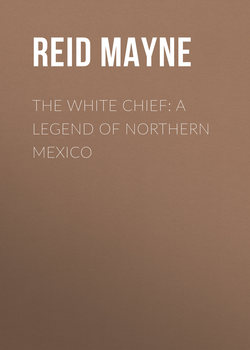Читать книгу The White Chief: A Legend of Northern Mexico - Reid Mayne - Страница 18
Chapter Eighteen
ОглавлениеOn the second day after the fiesta there was a small dining party at the Presidio. Merely a few bachelor friends of the Comandante – the beaux esprits of the place – including the fashionable Echevarria. The cura was among the number, and also the mission padrés, both of whom enjoyed the convivialities of the table equal to any “friar of orders grey.”
The company had gone through the numerous courses of a Mexican meal – the “pucheros,” “guisados,” and endless mixtures of “chilé,” – and the dinner was at that stage when the cloth has been carried off, and the wine flows freely, “Canario” and “Xeres,” “Pedro do Ximenes,” “Madeira,” and “Bordeos,” in bottles of different shapes, stood upon the table; and for those who liked a stronger beverage there was a flask of golden “Catalan,” with another of Maraschino. A well-stored cellar was that of the Comandante. In addition to his being military governor, he was, as already hinted, collector of the derechos de consume, or custom-house dues. Hence he was the recipient of many a little present, as now and then a basket of champagne or a dozen of Bordeaux.
His company had got fairly into the wine. The cura had thrown aside his sanctity and become human like the rest; the padrés had forgotten their sackcloth and bead-roll, and the senior of them, Padré Joaquin, entertained the table with spicy adventures which had occurred to him before he became a monk. Echevarria related anecdotes of Paris, with many adventures he had encountered among the grisettes.
The Spanish officers being the hosts were, of course, least talkative, though the Comandante – vain as any young sub who wore his epaulettes for the first time – could not refrain from alluding occasionally to his terrible list of bonnes fortunes among the fair Sevillanas. He had long been stationed at the city of oranges, and “la gracia Andalusiana” was ever his theme of admiration.
Roblado believed in the belles of the Havannah, and descanted upon the plump, material beauty which is characteristic of the Quadroons; while the lieutenant expressed his penchant for the small-footed Guadalaxareñas– not of old Spain, but of the rich Mexican province Guadalaxara. He had been quartered there.
So ran the talk – rough and ribald – upon that delicate theme – woman. The presence of the trio of churchmen was no restraint. On the contrary, both padrés and cura boasted of their liaisons with as much bawd and brass as the others, for padrés and cura were both as depraved as any of their dining companions. Any little reserve either might have shown upon ordinary occasions had disappeared after a few cups of wine; and none of them feared the company, which, on its part, stood as little in awe of them. The affectation of sanctity and self-denial was meant only for the simple poblanos and the simpler peons of the settlement. At the dinner-table it was occasionally assumed by one or the other, but only by way of joke, – to give point and piquancy to the relation of some adventure. In the midst of the conversation, which had grown somewhat general and confused, a name was pronounced which produced a momentary silence. That name was “Carlos the cibolero.”
At the mention of this name several countenances changed expression. Roblado was seen to frown; on Vizcarra’s face were portrayed mixed emotions; and both padrés and cura seemed to know the name unfavourably.
It was the beau Echevarria who had mentioned it.
“’Pon the honour of a cavallero! the most impudent thing I ever witnessed in all my life, even in republican Paris! A fellow, – a demned trader in hides and tasajo – in short, a butcher of demned buffaloes to aspire —Parbleu!”
Echevarria, though talking Spanish, always swore in French. It was more polite.
